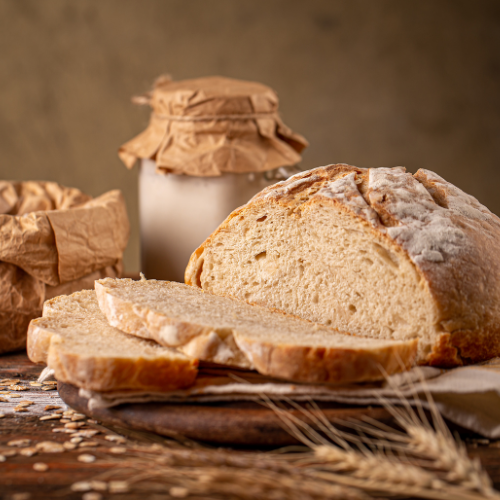10 health & lifestyle reasons to include Sourdough in your diet.

Sourdough bread has a long and rich history dating back to ancient Egypt when people figured out that if they left the dough to ferment over time, it would become easier to digest and taste better than regular bread. Although its popularity waned during the industrial age of bread, Sourdough has experienced a renaissance in recent years as people have become more interested in health and sustainability. Sourdough bread is often seen as a more healthy option because it is made with natural ingredients and does not require commercial yeast. Additionally, Sourdough is a more sustainable option because it requires less energy and water to produce. And since Sourdough bread is made with only a few simple ingredients, it is a more conscious choice for those looking to avoid processed foods.
Let’s explore the top 10 reasons we love sourdough.
1. It’s highly nutritious and tasty
Plant foods, especially grains, are naturally high in anti-nutrients like phytic acid or phytates. These may make it difficult for the body to absorb the nutrients in that particular food.
Whole grain bread, for instance, is full of minerals including magnesium, potassium, zinc, and phosphate, but their absorption may be difficult. Sourdough bread contains lactic acid, which neutralizes these compounds by lowering the bread’s PH, making the nutrients more available for absorption, especially if whole-grain flour was used.
According to research, sourdough fermentation may lower the phytate content in bread by more than 70 percent. The fermentation and lower PH in sourdough also increase antioxidant content and other nutrients.
Also, the longer the fermentation, the better the aroma, taste, and health benefits.
2. Promotes proper digestion
The natural fermentation involved in sourdough makes it easier for your stomach to digest compared to commercial bread made with baker’s yeast. Furthermore, people consuming sourdough bread are unlikely to report bloating issues, digestion problems, or intolerances.
Fermentation may also break down gluten, the main protein in wheat that is known to cause sensitivity and digestive issues in some individuals.
The process of fermenting splits up any traces of gluten, making sourdough bread more digestible, particularly for individuals who have a hard time digesting gluten.
Nevertheless, individuals with celiac disease must be careful, as sourdough still contains some amount of gluten. Instead, they should consume gluten-free sourdough bread such as from sorghum, brown rice flour, oats, or quinoa.
Moreover, the process of fermenting sourdough causes gluten-free bread to become spongier and also similar to common bread in terms of taste and volume.
Additionally, sourdough bread is full of prebiotics, an indigestible fiber that helps feed your good gut bacteria, thus increasing their population, diversity, and function, ultimately promoting a healthy digestive system.
3. It may promote weight loss
The high prebiotic profile in sourdough improves digestion and absorption of nutrients, which promotes glucose regulation and metabolism, causing one to burn fat and lose weight.
Sourdough bread made with whole grain is rich in fiber and low in the Glycemic index and Glycemic load, making it suitable for anyone looking to lose weight.
Glycemic index or GI is used to measure the rate at which certain foods raise blood sugar levels on a scale of 0 up to 100. Pure glucose or sugar is at 100. GI is quite high in processed foods compared to food high in fiber.
Glycemic load or GL is used to measure carbohydrates in food and how quickly they can raise blood glucose.
Sourdough bread contains a GL measurement of 8 and GI measurement of 54, while normal bread contains a GL of 9 and a GI measurement of 71.
4. Increases phytochemicals
The fermentation in sourdough bread decreases anti-nutrients while increasing valuable phytochemicals.
Research indicates that sourdough bread contains more carotenoids, phenols, and other valuable compounds compared to unfermented bread. Besides, these compounds offer anti-inflammatory and antioxidant benefits, promoting good health.
5. It’s rich in protein
Protein is an essential nutrient that gives structure and support to your cells and supports different immune functions. With a medium slice of sourdough bread containing 8 grams of protein, regular consumption may be a great way to boost your daily protein intake. Keep in mind that this value is for white bread, meaning whole-grain bread may contain even more protein.
6. It minimizes your consumption of yeast
The healthy bacteria that form in sourdough during fermentation help produce the gasses that facilitate rising without yeast. This ultimately reduces the risk of overgrowth or infection caused by yeast.
7. Easy to digest
Compared to bread made with commercial yeast, sourdough bread is much easier to digest. This means that it’s easier for your body to absorb its nutrients.
Sourdough bread is made of flour, water, and salt. All other bread is made with flour, water, and yeast. Sourdough fermentation makes the bread more digestible because the lactobacilli in the sourdough culture break down complex starches into simple sugars which are easily absorbed by the body.
8. Tastes better
Most people assume that sourdough bread has a tart taste, but because it is baked at lower temperatures than regular bread, it actually ends up with a milder flavor. The leavening process also means that sourdough keeps well and stays soft for a long time. If you bake your own sourdough, it’s important to know that different types of flour will give you different results.
For example, all-purpose flour makes a lighter loaf while whole wheat or rye flours make denser loaves. Experiment until you find what works best for you! But keep in mind that whole flours are always the best because they contain fiber that better aids the process of fermentation.
9. Low cost
One benefit that a lot of people think about when they first learn about sourdough bread is how much it costs. This is one area where sourdough does have an advantage over yeast. As a general rule, sourdough tends to be cheaper than yeast-raised bread.
This is because sourdough doesn’t need any extra ingredients aside from flour and water, and can be stored for longer periods at room temperature. Additionally, sourdough bread doesn’t require as much flour as regular yeast bread does
10. Fun
Making your own sourdough bread is easy, fun and empowering. If you must purchase store bought sourdough make sure to choose organic sourdough bread that is genuinely prepared following traditional natural methods.
Whether you're looking for better health, sustainability, or simply want to enjoy some delicious Sourdough bread, there are plenty of good reasons to give this ancient food a try.
EVERYTHING you will need to get started making your own Sourdough can be found in the Sensational Sourdough collection of our online store. If you have any questions relating to sourdough or any of the products or services we offer at Eden Tree Eco, please reach out. We’d love to help you in any way we can.
*Note: For those following a gluten-free diet, such as those with coeliac disease, sourdough made from wheat, rye, barley or other gluten-containing grains must be avoided. However, as long as non-gluten flours are used, the sourdough process itself should not cause a problem.






Leave a comment